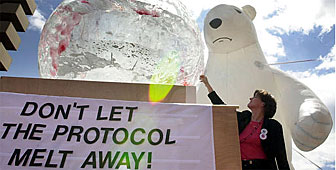Switzerland welcomes new global warming pact

The Swiss President, Moritz Leuenberger, welcomed the new international treaty on global warming on Monday, saying that although it did not adopt Switzerland's more ambitious position, it was a step in the right direction.
“The Bonn decision opens the way to ratification of the Kyoto Protocol for Switzerland,” said Leuenberger, who is also environment minister. The Swiss cabinet is expected to introduce the ratification process in 2002, he added.
Leuenberger called the treaty adopted by the conference in Bonn more “modest” than Switzerland’s position. Because of a Swiss law which specifically addresses the problem of carbon dioxide emissions, the country is already responding to some of the objectives of the Kyoto protocol, the Swiss president said.
The talks to rescue the 1997 Kyoto Protocol involved negotiators from nearly 180 nations, who continued the marathon sessions night and day in Bonn for 48 hours until they reached an accord.
The Swiss ambassador for the environment, Beat Nobs, was elated when key nations reached agreement after the tough negotiations.
“I’m considerably pleased. This protocol for us represents a very, very important step,” Nobs told swissinfo in a telephone interview from Bonn, where he had participated in the negotiations.
Nobs had been concerned about possible opposition from the Russians. “The Russians were not in the room at the last minute when the deal was concluded,” he said. But they later agreed to a compromise promoted by the European Union.
“It’s the first international agreement in that field and now we can go about implementing these measures,” Nobs said.
US opposes treaty
One country that still opposes the agreement to combat global warming is the United States. Although allies lobbied President George W. Bush at the G-8 summit in Italy over the weekend, Bush refused to change his opposition to the treaty. His view is that it would harm the US economy.
The negotiators were able to reach agreement after they compromised on the issue of enforcement. Specifically, they agreed on legally binding sanctions against violators of the treaty.
The treaty is expected to take effect in 2002, after 55 nations responsible for 55 percent of harmful greenhouse gas emissions have ratified it. Some 30 nations have already ratified the pact.
Flexibility helped deal
The treaty’s flexible approach to controlling global emissions helped its passage, the Swiss ambassador said.
It calls for the use of “sinks,” which are plant and other processes which remove greenhouse gases from the atmosphere.
The pact makes it possible for developing nations to comply with its environmental protection guidelines because it provides for financial assistance to the developing countries, Nobs said.
Switzerland joined a declaration of the European Union, Norway, Japan and other countries committed to $450 million in annual financial aid to developing countries, beginning in 2005. That financial assistance is expected to help the developing countries in preventing the buildup of greenhouse gases, and making changes that benefit the environment.
Nobs added that part of the treaty’s strength comes from a “compliance regime” which would be implemented to enforce it.
The next step, Nobs said, would be for the ambassador and the Swiss parliament to work together toward ratification.
Japan opposed enforcement clause
The reaction from other negotiators was also positive. “Almost every single country stayed in the protocol,” said Olivier Deleuze, the chief European Union negotiator, even though one said the Kyoto Protocol was “flawed.”
“This is a good text. It is a balanced text,” said conference chairman Jan Pronk, who had appealed to delegates not to offer new amendments which could lead to the collapse of the agreement.
Most delegations except Japan on Sunday night accepted Pronk’s compromise proposal on rules governing the protocol. Japan, which disagreed with the enforcement clause, later reached a compromise after delegates consulted with the nation’s prime minister.
By allowing sinks, the accord permits countries to offset obligations to reduce industrial pollution by counting the proper management of forests and farmlands that absorb carbon dioxide.
Environmental groups said allowing sinks reduced the environmental commitment in the Kyoto accord and means emissions will be reduced by lower levels than previously expected.
swissinfo with agencies

In compliance with the JTI standards
More: SWI swissinfo.ch certified by the Journalism Trust Initiative
You can find an overview of ongoing debates with our journalists here. Please join us!
If you want to start a conversation about a topic raised in this article or want to report factual errors, email us at english@swissinfo.ch.